REVIEW Performing arts group Rumah Anak Teater's (RAT) take on the death of political aide Teoh Beng Hock aims to give voice to the man who met his death at the Malaysian Anti-Corruption Commission's Shah Alam office three years ago.
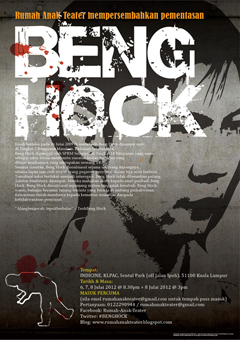 Ironically, the man ‘embodying' Teoh does not speak a word throughout the play - his silence itself being the biggest statement of the 45-minute drama.
Ironically, the man ‘embodying' Teoh does not speak a word throughout the play - his silence itself being the biggest statement of the 45-minute drama.
As producer and RAT managing director Faisal Mustaffa put it, dead men tell no tales; the man most central to the story can never speak of it. And so he is ‘given' a voice through another person.
"He is not Teoh Beng Hock, because Teoh Beng Hock is dead. That wasn't him, that was a man from the park, imagining it (the incident)," Faisal explained.
‘The man in the park' opens the play; moping on a bench. A stranger, a woman, walks in and correctly comes to the conclusion that he has just been sacked from his job.
She then schools him on the need to appreciate life by relating Teoh's story.
"You may have been fired, but you are still alive... Teoh Beng Hock, on the other hand, was lost to his fiancee and unborn child," she tells the man, who in his imagination segues into the ‘Beng Hock' character and lets the deceased Teoh ‘speak'.
It is with this simple, albeit powerful device that the whole tragedy is framed in Hariry Jalil's second directorial outing, simply titled ‘Beng Hock'.
However, it is not a definitive look at the death of the DAP political aide, which is still seen by many as "controversial", and neither does it claim to be. Instead, it reflects society's penchant for social commentary, where every person's take differs.
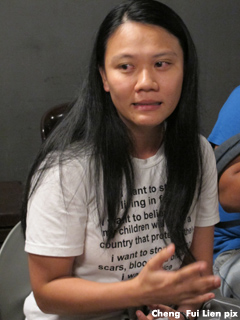 For Teoh Beng Hock's sister Teoh Lee Lan (
right
), the play was a reminder of the many unanswered questions in the Royal Commission of Inquiry (RCI) report it was based on.
For Teoh Beng Hock's sister Teoh Lee Lan (
right
), the play was a reminder of the many unanswered questions in the Royal Commission of Inquiry (RCI) report it was based on.
"The report is not the whole truth, the RCI tried to give us a half-truth," Lee Lan said after watching a preview of the play yesterday with members of the media.
However, she did take to heart the moral message of appreciating life as the central message of the play, her voice cracking with emotion as she spoke to the media.
It is undoubtedly the kind of reaction and impact the producers are hoping ‘Beng Hock' will have on the audience, as they hope the incident will "not be repeated". The play makes clear, and in no uncertain terms that tragedies are irreversible and therefore should never happen.
Interrogation scene
The entire interrogation scene leading up to the infamous plunging from the Selangor MACC headquarters is tensely-scripted, with the silence of ‘Beng Hock' contrasting painfully with the screams and threats of the interrogators.
The dark, dim interrogation scene is a world apart from the sunny, bright park scene, throwing into sharp relief the small worries of the man in the park when compared with the creeping dread of Teoh's predicament.
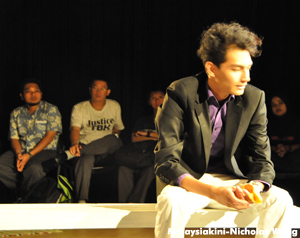 It is no doubt aided by the minimal setting - just a bench under a yellow bulb - which gives the audience a close, even intimate look into a man's worst personal moments.
It is no doubt aided by the minimal setting - just a bench under a yellow bulb - which gives the audience a close, even intimate look into a man's worst personal moments.
Faisal said that rather than the dialogue being the focal point of the scene, it was the atmosphere - the actors were given the outline of the situation from the RCI report, and they improvised their dialogue from there.
The improvised spontaneity of the dialogue no doubt adds to the authenticity of the aggression on display.
Watching the grim spectacle, the audience is unable to tear their eyes away, this itself a reflection of society's attraction to all things novel - whether happy, sad or brutal and horrifying.
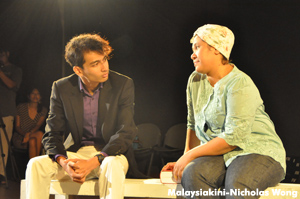 It brilliantly plays on its scripted ending, with every slap and head-wringing of ‘Beng Hock' teasing the inevitable tragedy at the end.
It brilliantly plays on its scripted ending, with every slap and head-wringing of ‘Beng Hock' teasing the inevitable tragedy at the end.
The presentation of aggression that drives the tension is framed in various ways throughout the play. It is an apt reminder that deliberate aggression can so easily slip into real danger, and with tragic consequences.
How many murders or accidents have taken place because confrontations got out of hand?
Unbridled anger
There is overwhelming intimidation, when the officers dial up their volume and aggression to cow the poor man, eventually combining in a chorus that only culminates in the character's painful silence.
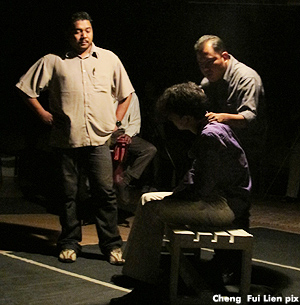 There is also the passive-aggressive approach, where the alternations between the violent interrogation officers and their softer, wheedling boss make overtures to the ‘good cop, bad cop' trope referenced in various other media.
There is also the passive-aggressive approach, where the alternations between the violent interrogation officers and their softer, wheedling boss make overtures to the ‘good cop, bad cop' trope referenced in various other media.
Lastly, there is the unbridled anger that sees ‘Beng Hock' hoisted up the window, where the ultimate break in patience of the interrogation officers subverts the notion that they are the ones in control of the situation.
What is left is a broken man lying on the floor. But the play ends where it begins, with the man lying on the park bench sitting up, and stepping out of his imagination.
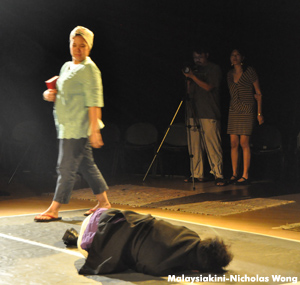 Seeing the dead ‘Beng Hock' rise evokes the wishful thinking people take refuge in when faced with irreversible change, especially when it comes to death.
Seeing the dead ‘Beng Hock' rise evokes the wishful thinking people take refuge in when faced with irreversible change, especially when it comes to death.
We are reminded of the fact that the ones in power are not always the ones in control. The MACC officers, for all their power over Teoh, lost control in the face of his composure.
A line from the play's poster is revealing: Kewarasan itulah membawa kepada kematian-kematian daripada ketidakwarasan penyiasat (It was sanity that lead to death, from the insanity of the interrogators).
Catch 'Beng Hock' at the Kuala Lumpur Performing Art Centre at 8.30pm this weekend.

